General Election 2024 Records Lowest Fairness Score Since 2013: PILDAT
ECP Must Provide Answers and Rebuild Trust in Electoral Process: PILDAT
The Pakistan Institute of Legislative Development and Transparency (PILDAT) has released its assessment of the 2024 General Election, indicating a concerning decline in fairness scores compared to previous election cycles. Overall fairness of the 2024 General Election in Pakistan received a score of 49% which is three percentage points lower than the score received for the 2018 General Election. Fairness assessment scores for the 2013 and 2018 elections stood at 57% and 52% respectively.
Overall, these scores, particularly the steady decline in them since 2013, are emblematic of the weakening of the democratic processes in Pakistan and they underscore the urgent need to restore public confidence in the electoral system. To address these challenges, PILDAT recommends enhancing transparency and accountability measures throughout the electoral process. PILDAT calls on the Election Commission of Pakistan (ECP) to conduct a thorough investigation into the delays and deficiencies observed during the 2024 General Election, particularly in result compilation, transmission and consolidation.
-
The 2024 General Election’s fairness score plummeted to 49% – the lowest since 2013 – signaling a troubling trend in election integrity
-
Despite advancements, the pre-poll phase has stalled at a 50% fairness score since 2018, indicating persistent pre-election issues
-
Polling day’s voting process score dipped to 58% in 2024 from 64% in 2018, yet showed a rise from 44% in 2013, reflecting fluctuating levels of voter experience
-
No progress in result management since 2018 with the score stuck at 40% – highlighting a critical need for inquiry into EMS operation
-
The post-poll satisfaction hit a historic low matching the 2002 score of 40% pointing to increasing public distrust in electoral outcomes
Figure 1: Comparative Assessment of the Overall Quality of General Elections in Pakistan
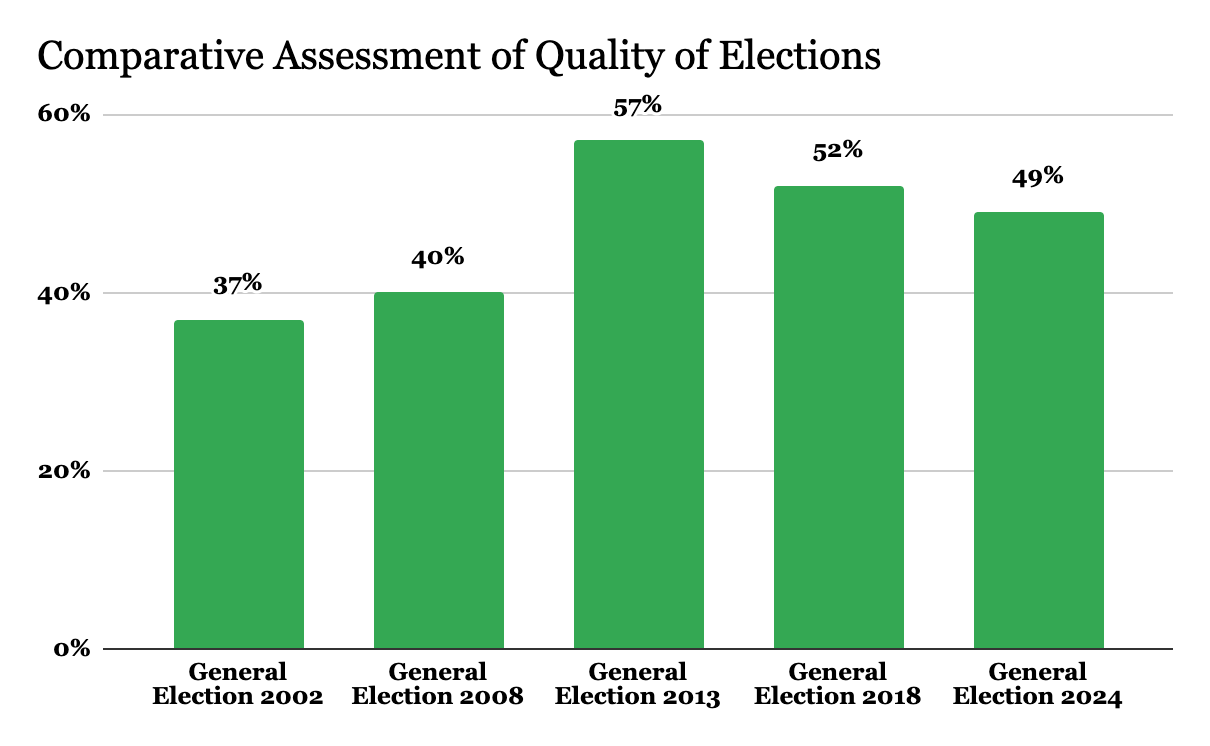
Our Findings
The PILDAT Assessment of the Quality of General Election 2024 is a continuation of our earlier General Election assessment reports that we have published every election cycle since 2002. The 2024 assessment report is based on our independent analysis alongside a questionnaire that was scored by a cross-section of civil society, comprising politicians, lawyers, activists, academics, retired bureaucrats and retired military officials as well as politically aware youth.
In this report, we have highlighted the following key issues which have negatively impacted the quality of the 2024 General Election:
- During the pre-poll phase, we observed considerable delays in scheduling of the election, political repression, lack of impartiality from Caretaker Governments and State institutions and worsening law and order in Khyber Pakhtunkhwa and Balochistan.
- On polling day, the suspension of mobile phone and internet services not only compromised the Election Management System (EMS) but also created problems for public participation in the electoral process.
- After polling was completed, the delay in the announcement of the provisional results beyond the deadline fixed in Section 13(3) of the Elections Act, 2017, prompted serious questions about the credibility of election.
- The widespread allegations of discrepancy between Forms-45 and Form-47 have also added to the concerns about the credibility of the election.
- The delay in the publishing of Forms 45, 46, 48 and 49 on the ECP website – a violation of Section 95 (10) of Elections Act, 2017 – has further damaged the credibility of the election.
- Lastly, the allocation of reserved seats to SIC continued to be a major point of contention for 25 days since the polling day while reserved seats were allocated to all other political parties.
Figure 2: Comparative Assessment of the Quality of General Elections in Pakistan, Segmented
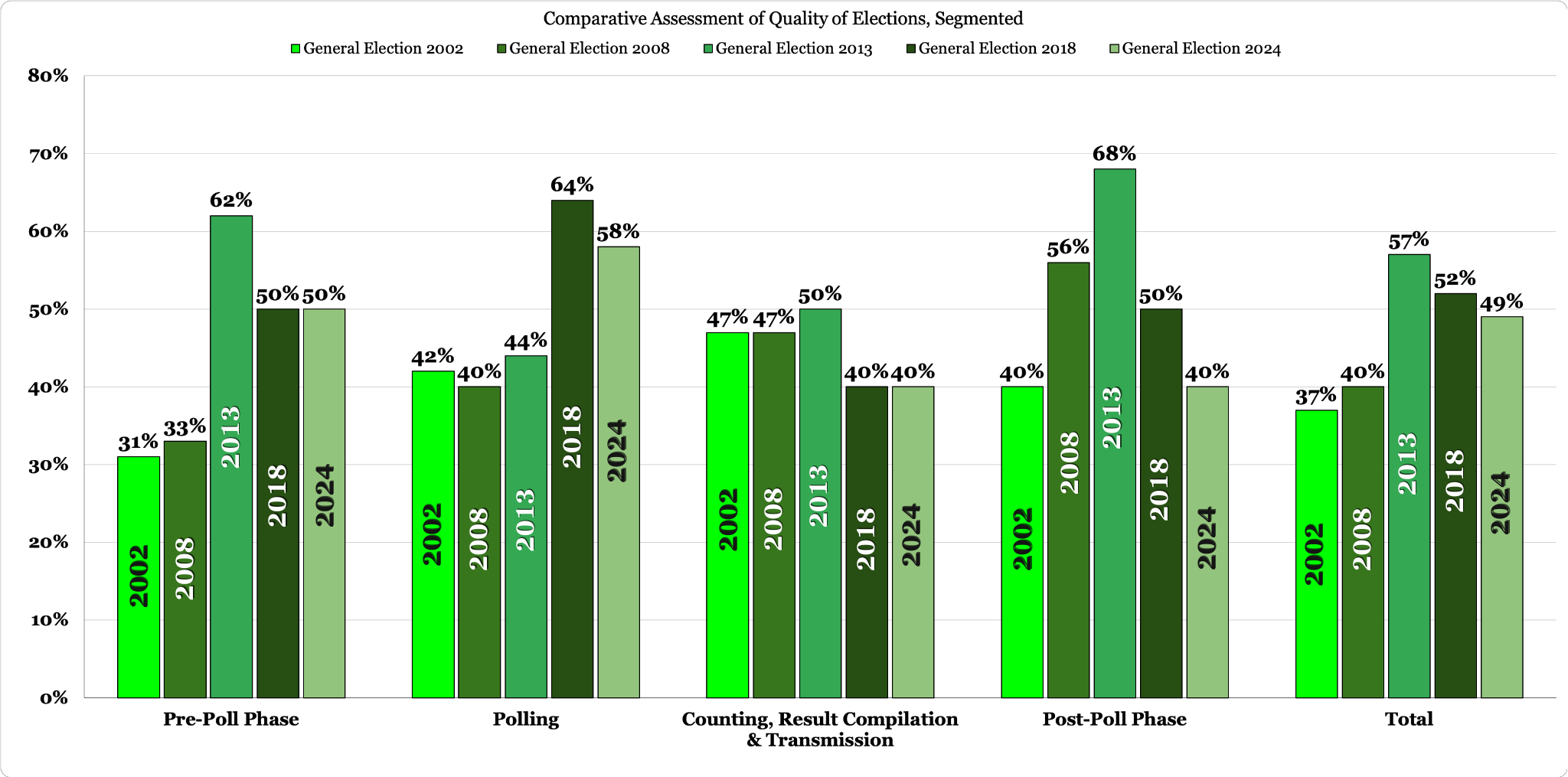
Pre-poll Phase: In the first segment of the assessment dealing with pre-poll phase, the questions about the impartiality of key institutions such as the Judiciary, the ECP, Caretaker Governments at the Federal and Provincial levels, media, security forces and intelligence agencies were examined. Additionally, the issues of law and order, candidates’ diversity, delimitation of constituencies, and electoral rolls were also assessed. The overall assessment score assessed for the pre-poll phase in 2024 General Election stood at 50%, matching that of 2018 but falling significantly short of the 2013 score of 62%. This shows that in the pre-poll phase, both the 2018 General Election and the 2024 General Election were equally fair or unfair.
The second segment of the assessment, the polling day phase, was divided into two parts.
Part 1: Polling Process on the Election Day: The part one assessed the voting process itself, including the performance of polling staff, the quality of polling stations, and safety during voting hours. The assessment score received for the 2024 General Election stood at 58% for this part. The score assigned was lower than the score assessed for the 2018 General Election, which was 64%. This shows that in our assessment, the phase of polling day, including the voting process, performance of polling staff, quality of polling stations, and safety during voting hours was assessed to be poorer than that of 2018 General Election. However, it scored higher than the score of General Election 2013 which stood at 44%. This is probably because there was greater terrorist activity during election time in 2013.
Part 2: Counting of Votes, Compilation, Transmission, Consolidation & Announcement of Provisional Results: The part two of the polling day phase was about the counting of votes, compilation and transmission of results from Polling Stations to Returning Officers, consolidation of constituency results and announcement of provisional results. The assessment score assigned to this phase in 2024 General Election stood at 40%, which was identical to that of the 2018 General Election. In 2013 General Election, the same phase received the score of 50% while in both 2002 and 2008 GEs, it was 47%. The fact that the score for this part of the electoral process never crossed the 50% mark, indicates that this area requires focused attention and effort for improvement.
Post-poll Phase: In the last segment of the assessment, the post-poll phase, the response of political parties, election observers and the electorate to the election outcomes, compiling and publishing of final results and the process of formation of governments at the federal and provincial levels were assessed. The 2024 election scored 40% for this phase, an all-time low score which mirrored that of the 2002 General Election which had seen unprecedented post-poll rigging in recent years. This low score indicates a low level of trust for the post-election phase.
Overall, the Quality of General Election 2024 has scored 49% which is not only below 50% score but is also lower than the overall score of the past two elections – 52% for GE-2018 and 57% for GE-2013 indicating greater concerns about the quality of the most recent General Election. These overall scores, particularly the steady decline in them since 2013, are emblematic of the weakening of the democratic processes in general and electoral system in particular in Pakistan and they underscore the urgent need to restore public confidence in the electoral system.
Within 2024 General Election process, both the part two of the polling day operations i.e. counting, compiling, transmission, consolidation, announcement of provisional results and the post-election process received the least scores of 40% indicating that these two areas were the weakest links in the electoral chain in General Election 2024.
Our Recommendations
While the ECP had been effectively communicating its decisions and points of view prior to the polling day, this communication appears to have considerably slowed down since then. The issues listed above have not been effectively addressed by the ECP in their communications. Given this context, it is imperative that there are efforts to increase transparency and accountability so that public confidence in the electoral process can be restored.
We recommend that the Election Commission of Pakistan (ECP) conduct a thorough and impartial investigation into (i) the delays in the transmission, consolidation and announcement of provisional results, (ii) the lack of contingency planning to meet result issuance deadlines in case of the EMS inoperability and (iii) the failure to publish signed copies of forms 45, 46, 48 and 49 within 14 days of polling day as required under the Elections Act, 2017.
We also recommend that, in order to bring the controversies relating to GE2024 to a close, a clear path be decided for the way forward. There are only two possible avenues to consider. The first one is to allow Election Tribunals to resolve disputes on a case-by-case basis. Although Election Tribunals are given a legal deadline of 180 days to decide election petitions, many petitions take much longer to decide. PILDAT is deeply concerned that only two (2) Election Tribunals have been constituted in Punjab compared to eight (8) constituted after 2018 General Election and nine (9) reportedly requested by the ECP this time. This indicates that a much longer delay in deciding election petitions is expected this time. PILDAT strongly demands that the number of Election Tribunals be adequately increased to decide ALL election petitions within the legal deadline of 180 days without fail.
The second one is, in addition to the election tribunals, to constitute a Commission of Enquiry like the one formed to probe the General Election 2013. The incoming National Assembly and the Senate should deliberate and decide whether a Commission of Enquiry be constituted to ensure accountability, transparency and political stability.
Overall, the controversies and challenges that dominated the 2024 election cycle in Pakistan point once again to the need for transparency and accountability to overcome systemic shortcomings and safeguard the integrity of future electoral processes.
Assessment of the Quality of General Election 2024 and its comparison with 2002, 2008, 2013 and 2018
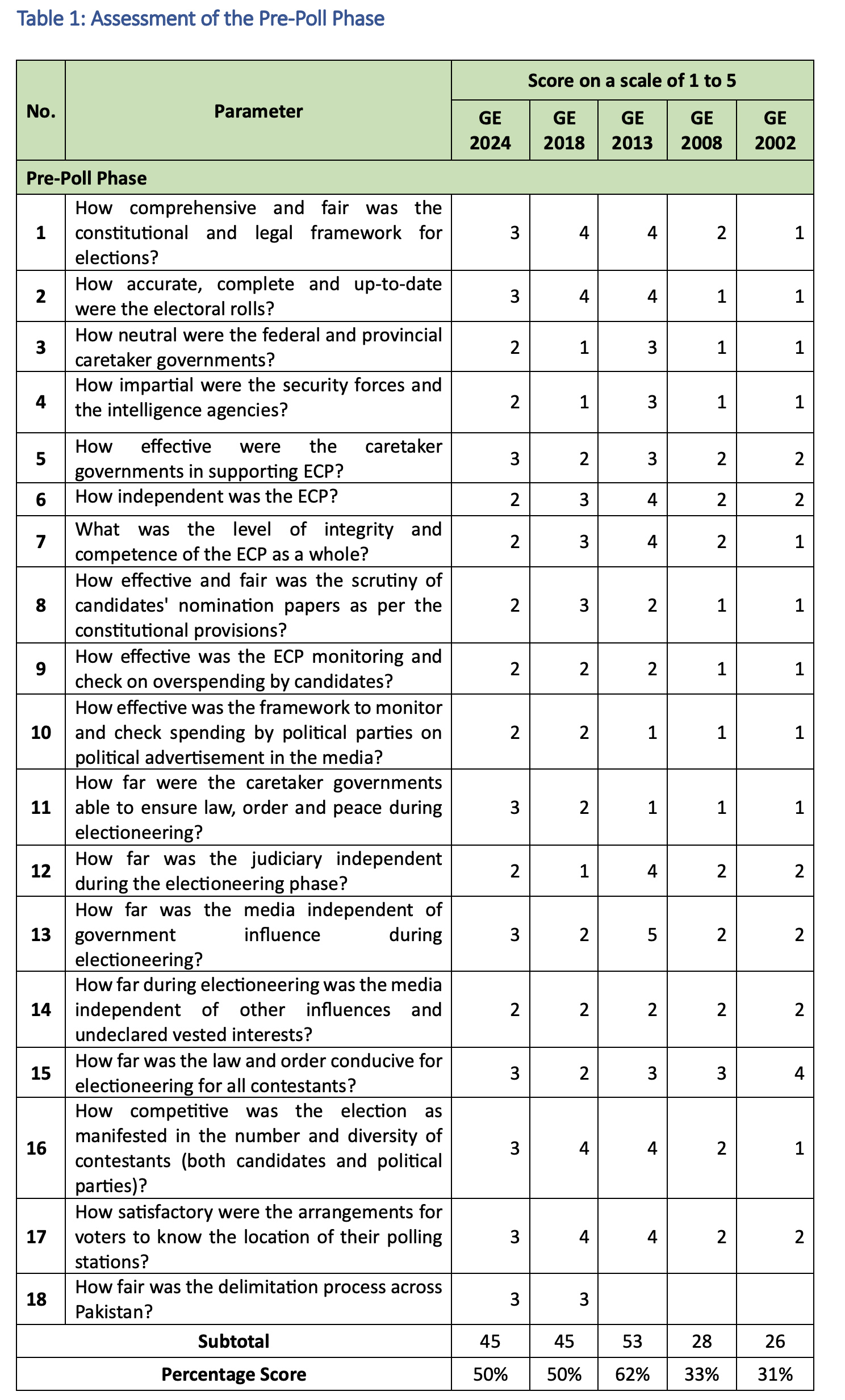


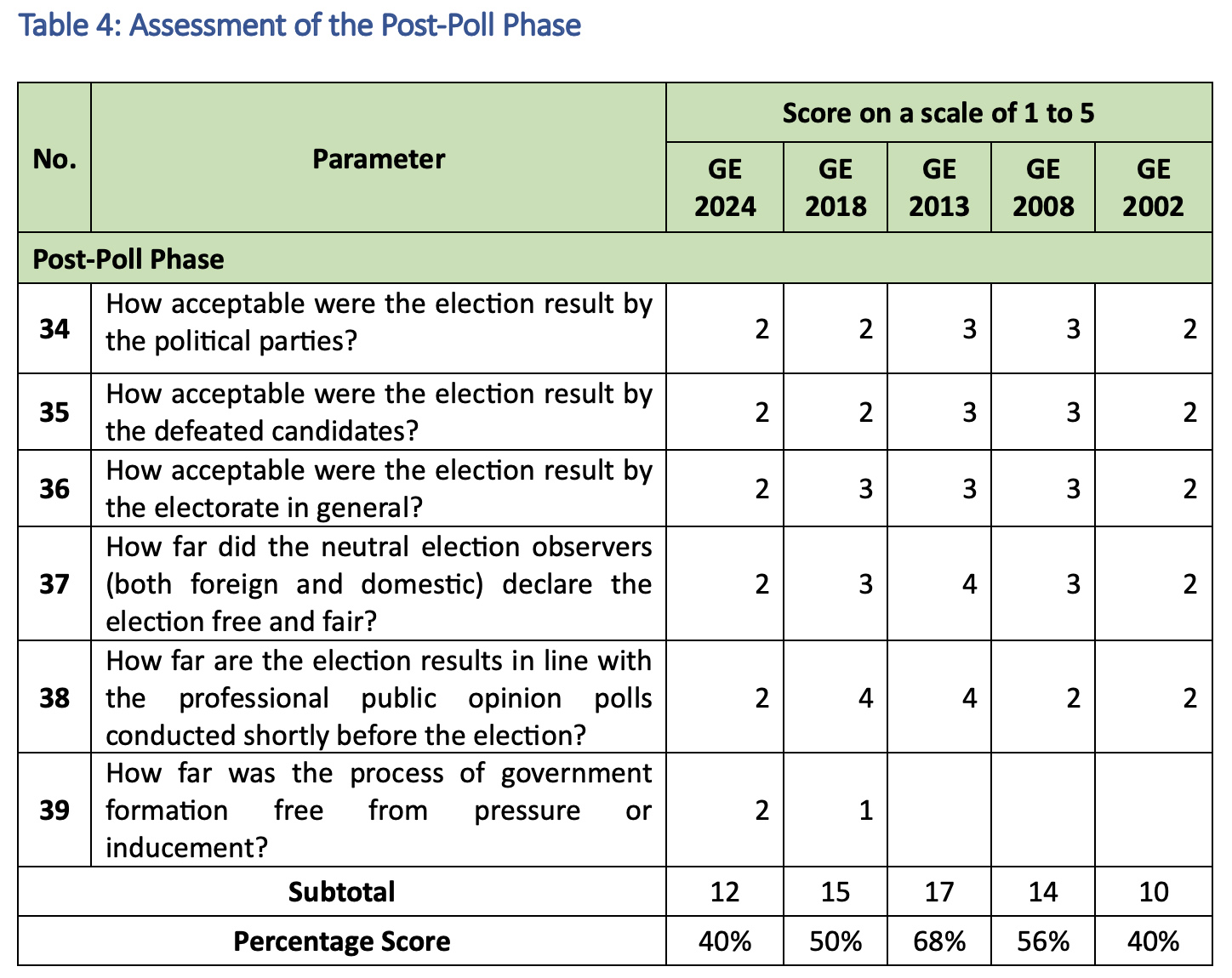
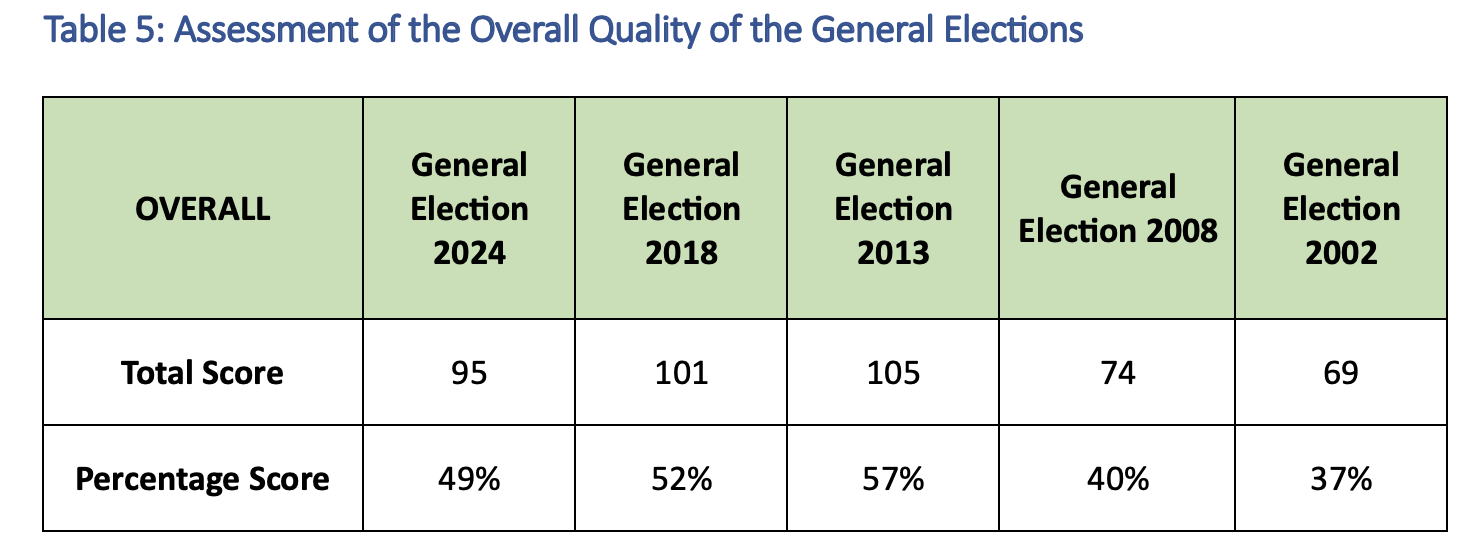
Note: 1 indicates lowest score and 5 indicates highest score.
The full report can be downloaded here.







